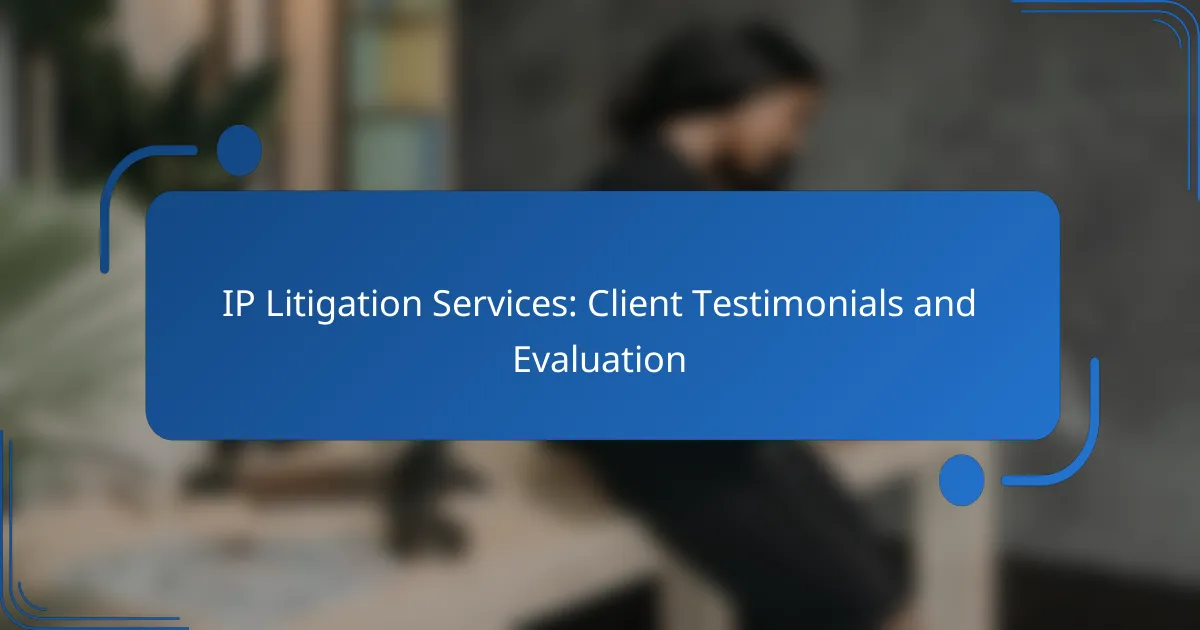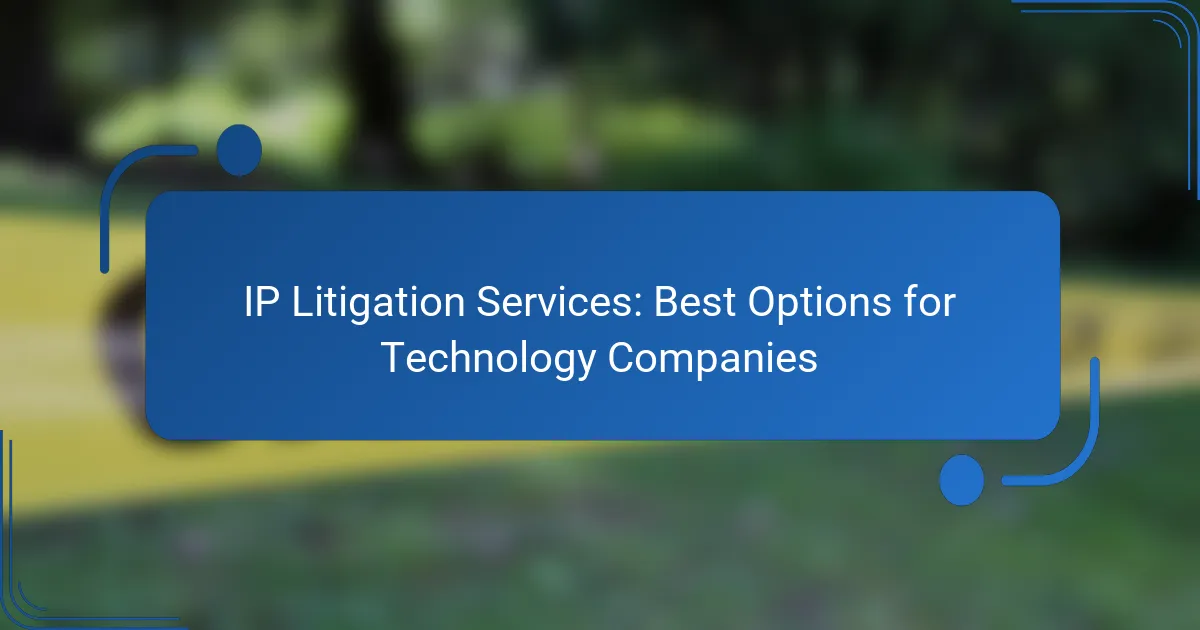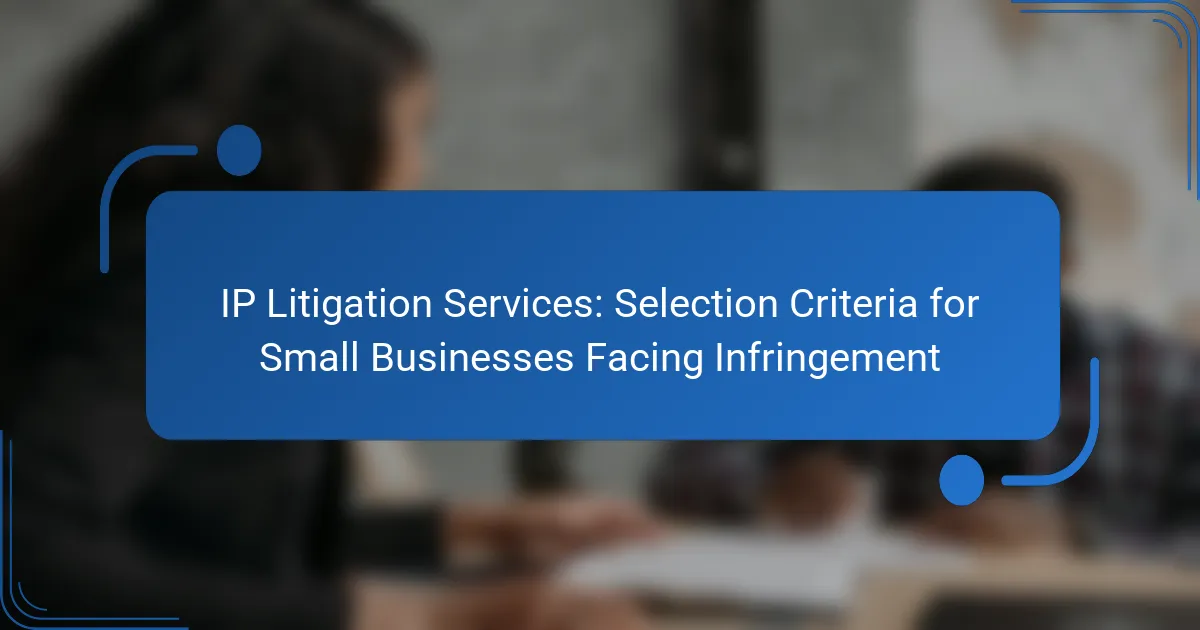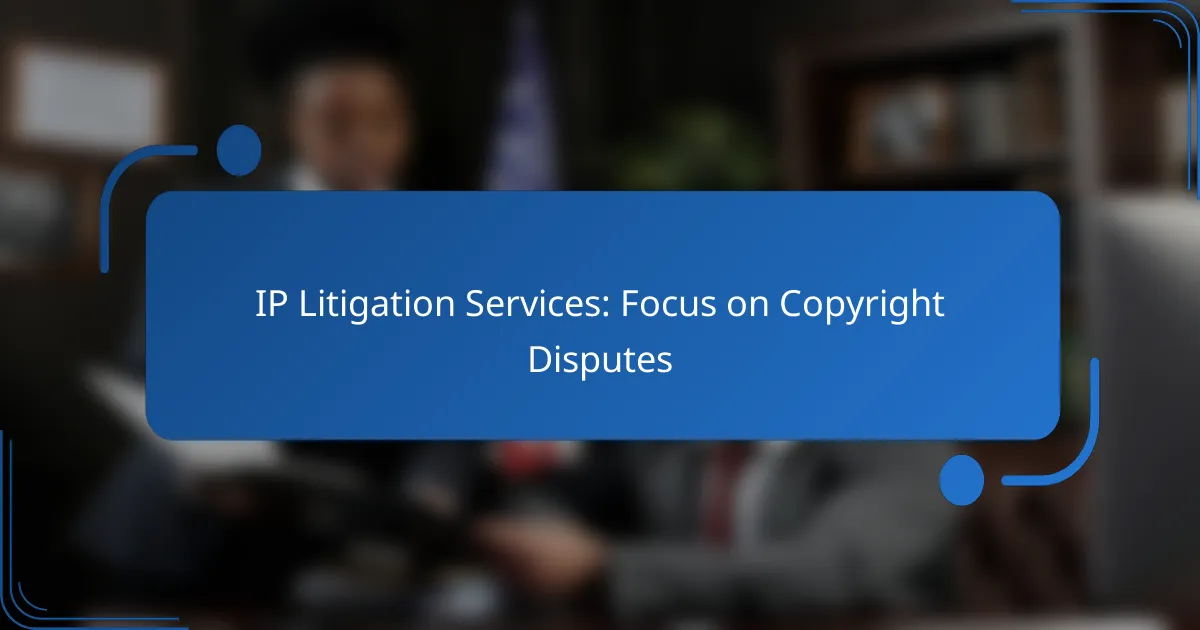IP litigation services are crucial for safeguarding intellectual property rights, guiding clients through intricate legal challenges to protect their innovations. Client testimonials offer valuable insights into the effectiveness and quality of these services, reflecting real experiences and satisfaction levels. When evaluating IP litigation firms, it is essential to consider their experience, success rates, and client feedback to ensure the best possible representation.
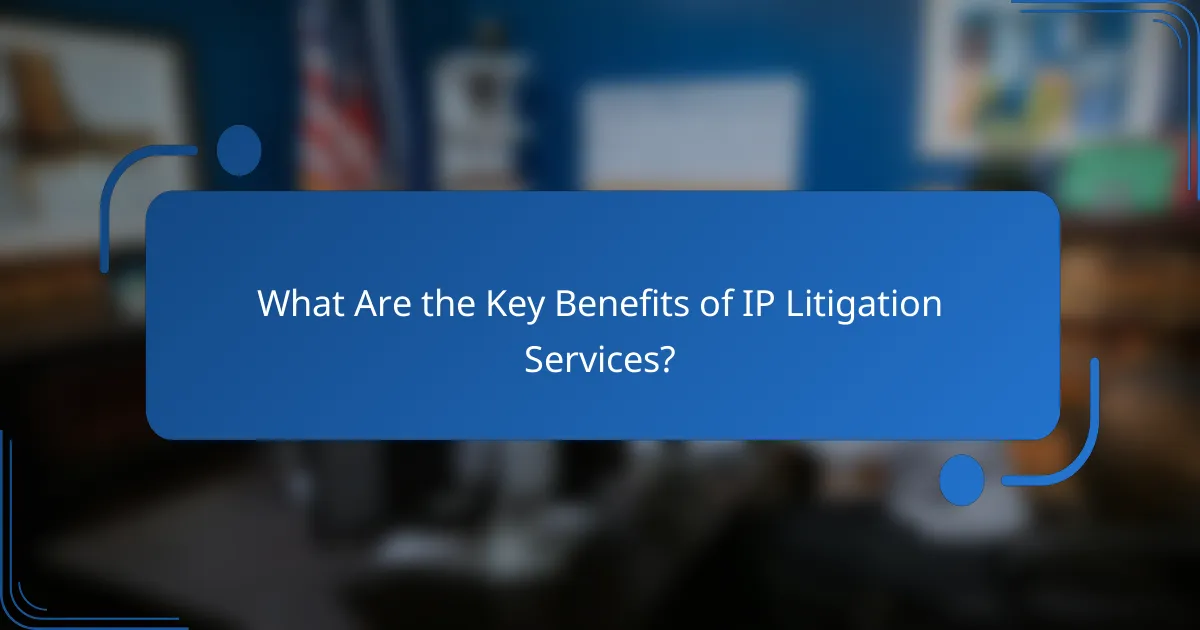
What Are the Key Benefits of IP Litigation Services?
IP litigation services provide essential support for businesses and individuals seeking to protect their intellectual property rights. These services help navigate complex legal landscapes, ensuring that clients can defend their innovations and creations effectively.
Protection of Intellectual Property
One of the primary benefits of IP litigation services is the robust protection they offer for intellectual property. This includes safeguarding patents, trademarks, copyrights, and trade secrets against infringement. By pursuing legal action, clients can deter unauthorized use and maintain their competitive edge.
Effective protection often involves monitoring the market for potential infringements and taking swift action when necessary. Engaging legal experts can help identify threats and develop strategies to mitigate risks associated with IP violations.
Expert Legal Representation
IP litigation services provide clients with access to expert legal representation, which is crucial in navigating the complexities of intellectual property law. Experienced attorneys understand the nuances of IP cases and can craft tailored legal strategies that align with the client’s objectives.
Having skilled representation can significantly influence the outcome of a case, as these professionals are adept at negotiating settlements and presenting compelling arguments in court. This expertise is vital for achieving favorable results in disputes over intellectual property rights.
Cost-Effective Solutions
IP litigation services can offer cost-effective solutions by providing clients with a clear understanding of potential expenses and outcomes. Many firms offer flexible pricing models, including contingency fees, which can alleviate the financial burden on clients.
By investing in IP litigation services, clients can avoid costly mistakes that may arise from inadequate protection or mismanagement of their intellectual property. This proactive approach can ultimately save money in the long run by preventing losses from infringement.
Faster Resolutions
Utilizing IP litigation services can lead to faster resolutions in disputes, allowing clients to return to business operations with minimal disruption. Skilled attorneys often have established relationships with courts and can expedite processes through effective case management.
Additionally, alternative dispute resolution methods, such as mediation or arbitration, can be employed to resolve conflicts more quickly than traditional litigation. This flexibility can be particularly beneficial for businesses that need to maintain their market position.
Access to Specialized Knowledge
IP litigation services grant clients access to specialized knowledge that is critical for navigating the intricacies of intellectual property law. Legal professionals in this field stay updated on the latest regulations, case law, and industry trends, ensuring that clients receive informed guidance.
This specialized knowledge can be invaluable when assessing the strength of a case or determining the best course of action. Clients benefit from insights that can help them make strategic decisions regarding their intellectual property assets.
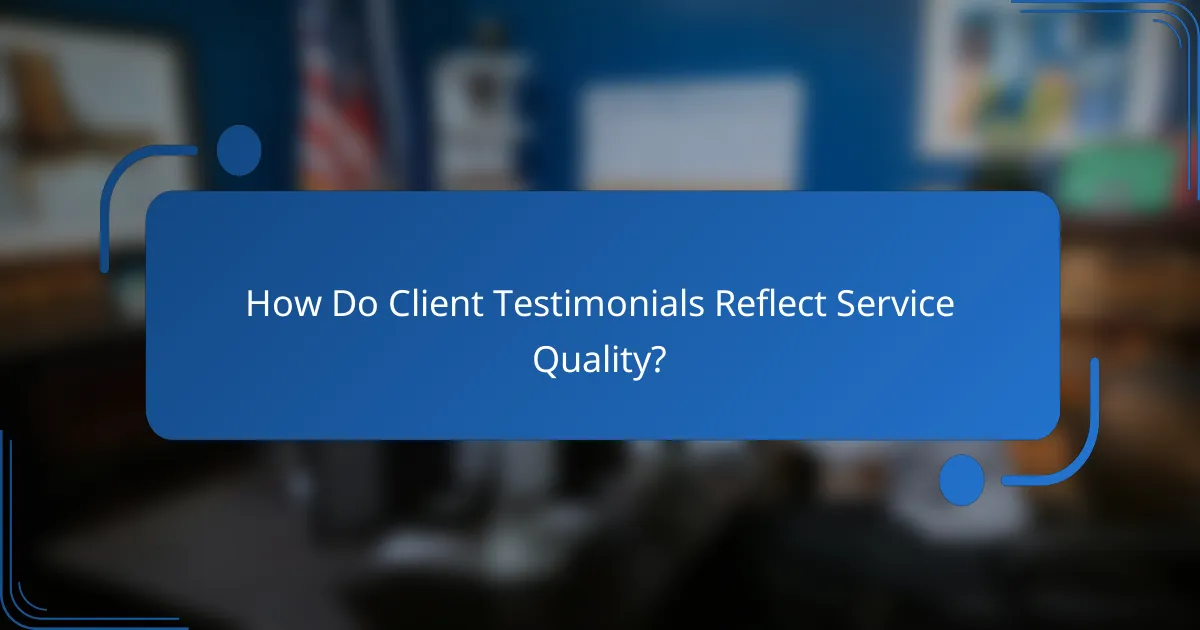
How Do Client Testimonials Reflect Service Quality?
Client testimonials serve as a direct indicator of service quality, showcasing real experiences and satisfaction levels. They provide insights into how effectively a firm handles IP litigation and the outcomes clients can expect.
Positive Client Experiences
Many clients report positive experiences when working with IP litigation services, highlighting effective communication and dedicated support. Clients often appreciate how their legal teams prioritize their needs and provide clear updates throughout the litigation process.
For instance, a client may express gratitude for a lawyer who took the time to explain complex legal terms, making them feel more informed and involved in their case. Such testimonials often emphasize the personal touch that enhances client confidence.
Case Studies of Successful Outcomes
Case studies illustrate the tangible successes achieved through IP litigation services, often detailing specific strategies that led to favorable results. For example, a firm might share a story of successfully defending a patent against infringement, resulting in a significant financial settlement for the client.
These narratives not only highlight the firm’s expertise but also serve as a benchmark for potential clients assessing the likelihood of success in their own cases. Understanding these outcomes can help clients set realistic expectations for their legal journeys.
Client Satisfaction Ratings
Client satisfaction ratings are a quantifiable measure of service quality in IP litigation. Many firms collect feedback through surveys, often reporting satisfaction rates in the high 80s to low 90s percent range, indicating a strong level of client approval.
These ratings can be a useful tool for prospective clients when evaluating different firms. A high satisfaction rating often correlates with effective case management and successful outcomes, making it a critical factor in the decision-making process.
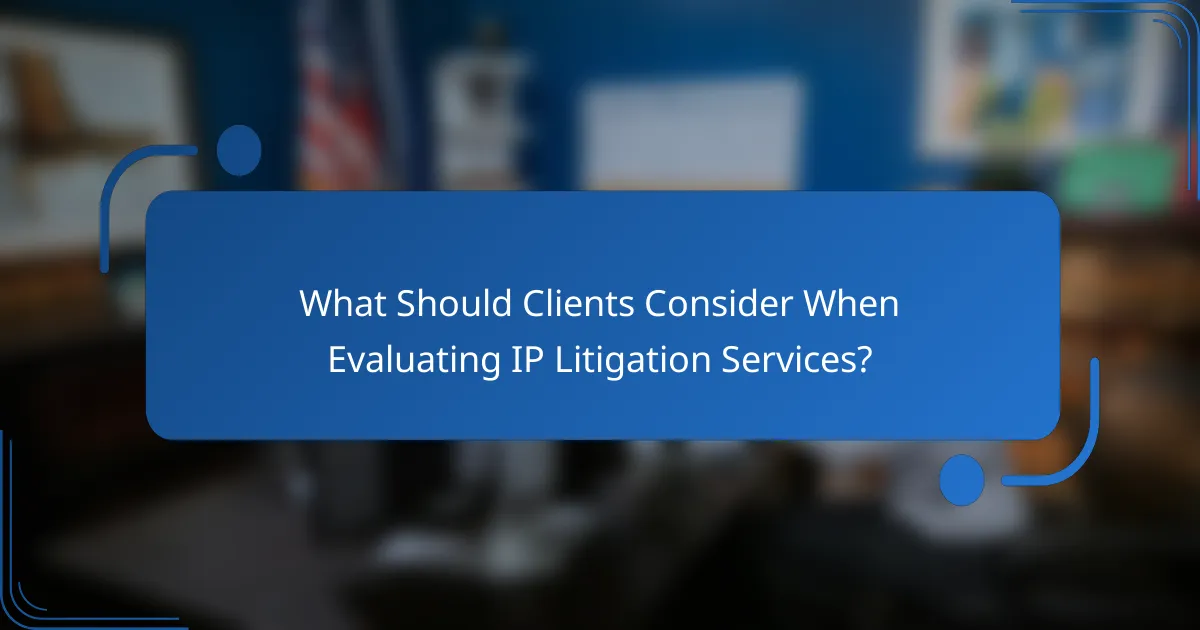
What Should Clients Consider When Evaluating IP Litigation Services?
Clients should focus on the experience, success rates, and client feedback when evaluating IP litigation services. These factors can significantly influence the outcome of a case and the overall satisfaction with the legal representation.
Experience and Expertise of Attorneys
The experience and expertise of attorneys in IP litigation are crucial. Look for firms with a proven track record in handling cases similar to yours, particularly in your industry. Attorneys with specialized knowledge in intellectual property law can navigate complex legal issues more effectively.
Consider the number of years the attorneys have been practicing and their specific areas of focus within IP law, such as patents, trademarks, or copyrights. A firm with a diverse team can offer a broader range of insights and strategies.
Success Rates in Similar Cases
Success rates in similar cases provide insight into a firm’s effectiveness. Ask potential attorneys about their win-loss records and the outcomes of cases that resemble yours. A high success rate can indicate a strong understanding of the legal landscape and effective litigation strategies.
Keep in mind that success can vary based on factors such as the nature of the IP involved and the jurisdiction. Therefore, consider firms that have achieved favorable outcomes in your specific context.
Client Reviews and Testimonials
Client reviews and testimonials are valuable resources when evaluating IP litigation services. Look for feedback on the firm’s communication, responsiveness, and overall client satisfaction. Positive testimonials can highlight the firm’s strengths and the quality of their legal representation.
Consider checking independent review platforms or legal directories to gather unbiased opinions. Engaging with past clients, if possible, can provide deeper insights into what you can expect during your litigation process.
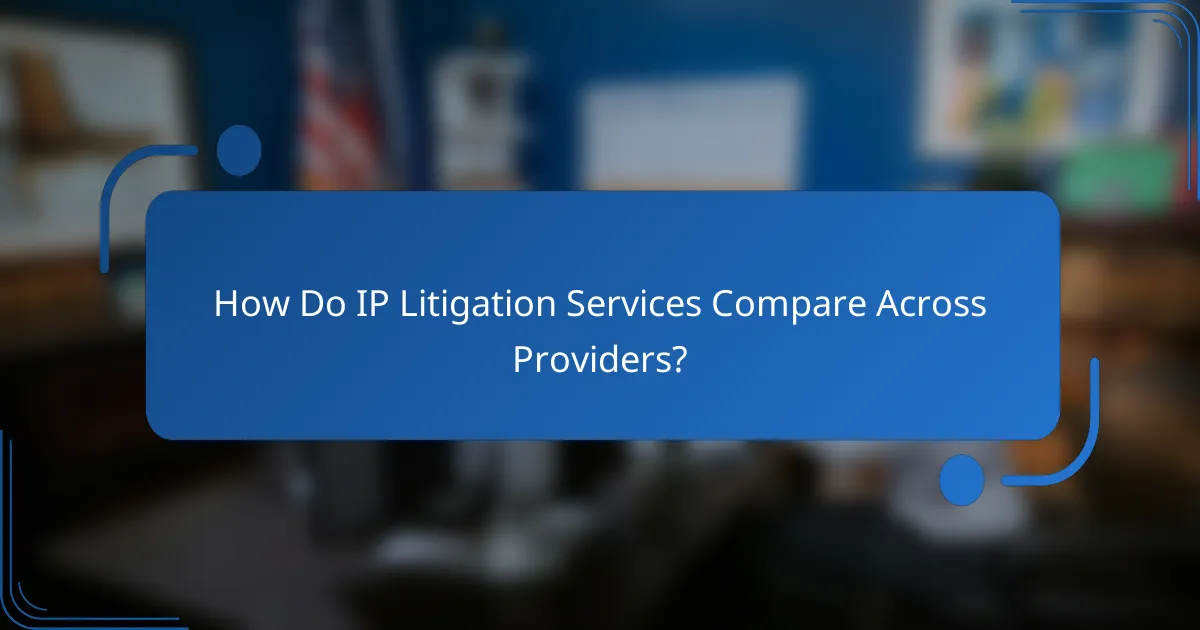
How Do IP Litigation Services Compare Across Providers?
IP litigation services can vary significantly among providers in terms of fees, service offerings, and client support. Understanding these differences is crucial for making informed decisions when selecting a provider for intellectual property disputes.
Comparison of Fees and Costs
Fees for IP litigation services can range widely depending on the provider’s expertise and the complexity of the case. Typically, hourly rates may vary from low hundreds to over a thousand USD, while flat fees for specific services can also be negotiated.
Consider additional costs such as court fees, expert witness fees, and potential settlement costs. It’s essential to request a detailed breakdown of all potential expenses upfront to avoid surprises later.
Service Offerings and Specializations
Different providers may specialize in various aspects of IP litigation, such as patent, trademark, or copyright disputes. Some firms may focus on high-stakes litigation, while others may offer more comprehensive services, including mediation and arbitration.
When evaluating providers, consider their track record in specific types of cases relevant to your needs. Look for firms that have successfully handled similar disputes and can demonstrate their expertise through client testimonials or case studies.
Client Support and Communication
Effective client support and communication are vital in IP litigation. Providers should offer regular updates and be accessible for questions and concerns. Assess how responsive a firm is during initial consultations as this can be indicative of their ongoing support.
Consider the tools and platforms used for communication. Some firms may utilize client portals for case management, while others may rely on traditional methods. Ensure that their approach aligns with your preferences for timely and clear communication throughout the litigation process.
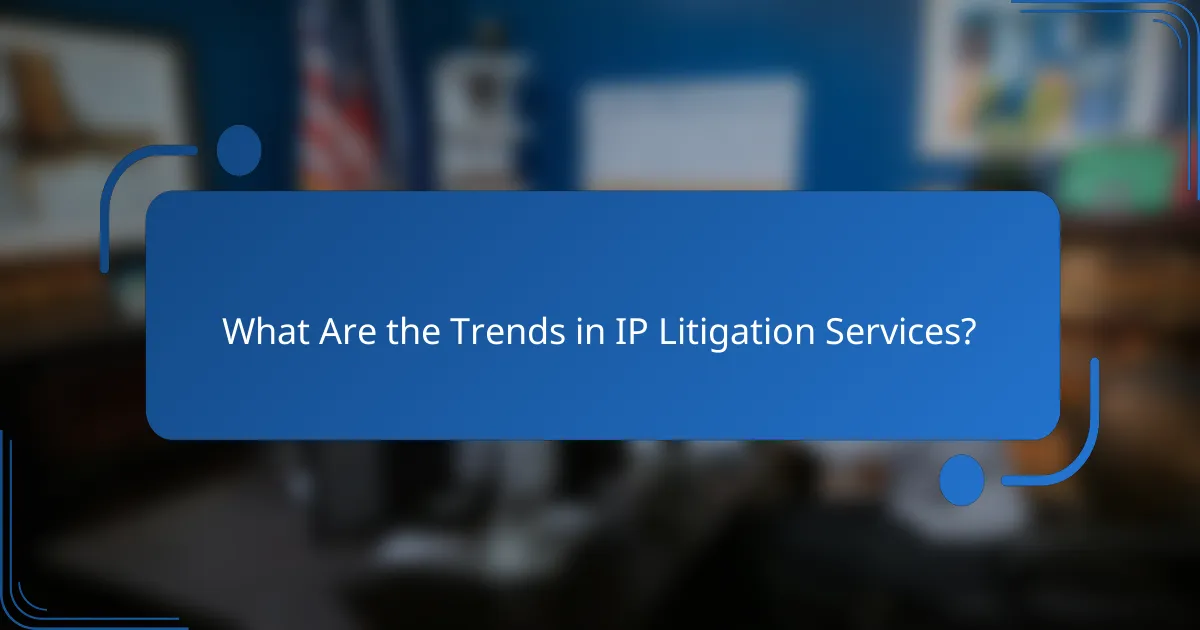
What Are the Trends in IP Litigation Services?
Trends in IP litigation services are increasingly shaped by technological advancements, evolving regulations, and changing client demands. Understanding these trends helps clients navigate the complexities of intellectual property disputes more effectively.
Emerging Technologies Impacting IP Law
Technological innovations such as artificial intelligence, blockchain, and the Internet of Things are significantly influencing IP law. These technologies create new types of intellectual property that require updated legal frameworks and strategies for protection and enforcement.
For instance, AI-generated content raises questions about authorship and ownership, while blockchain technology offers new methods for tracking and verifying IP rights. Legal professionals must stay informed about these developments to provide effective representation.
Changes in Legislation and Regulations
Recent changes in legislation and regulations are reshaping the landscape of IP litigation. For example, many jurisdictions are updating their copyright laws to address digital content and online distribution, which can impact how cases are litigated.
Clients should be aware of these changes, as they may affect the strength of their claims or defenses. Keeping abreast of local laws and international treaties is crucial for effective IP management and litigation strategy.
Shifts in Client Expectations
Clients today expect more transparency, efficiency, and results from their IP litigation services. They seek legal teams that not only understand the law but also leverage technology to streamline processes and reduce costs.
To meet these expectations, law firms are increasingly adopting alternative fee arrangements and utilizing data analytics to predict case outcomes. Clients should communicate their needs clearly and evaluate potential legal partners based on their ability to adapt to these evolving demands.
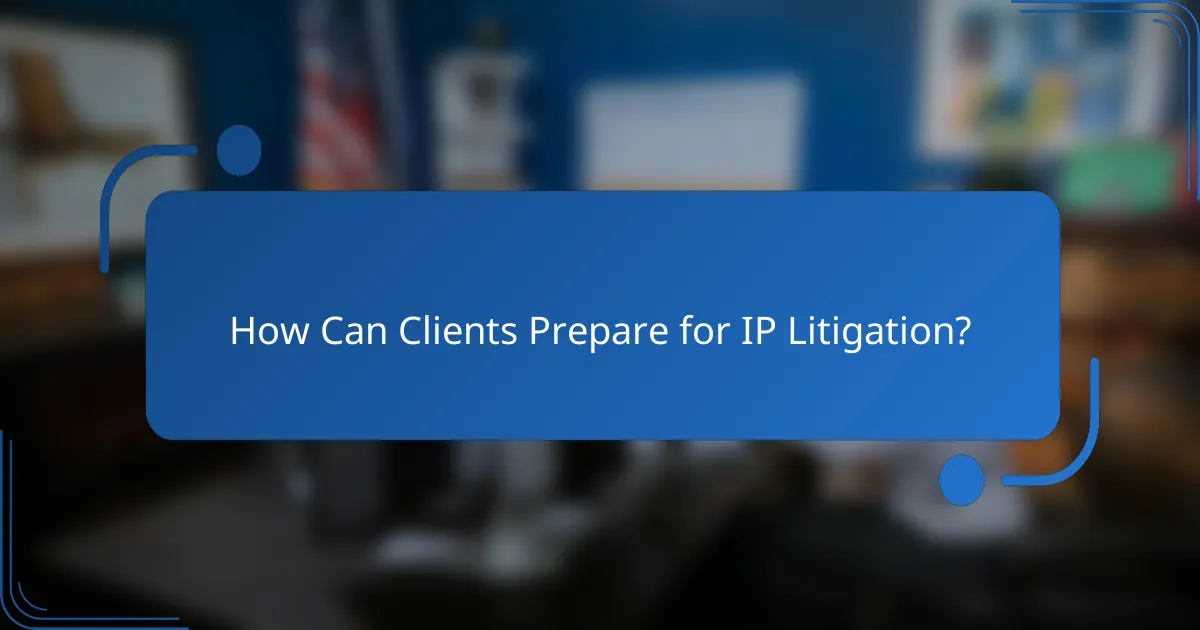
How Can Clients Prepare for IP Litigation?
Clients can prepare for IP litigation by understanding the key steps involved and gathering the necessary resources. Effective preparation can significantly impact the outcome of the case and streamline the legal process.
Gathering Necessary Documentation
Collecting the right documentation is crucial for a successful IP litigation strategy. This includes any patents, trademarks, copyrights, and relevant agreements that pertain to the intellectual property in question.
Clients should also compile evidence of use, such as sales records, marketing materials, and correspondence related to the IP. Organizing these documents in a clear and accessible manner can facilitate discussions with legal counsel.
Additionally, consider creating a checklist of essential documents to ensure nothing is overlooked. Common items might include registration certificates, licensing agreements, and any prior litigation records related to the IP. This thorough preparation can help avoid delays and strengthen your position in litigation.
